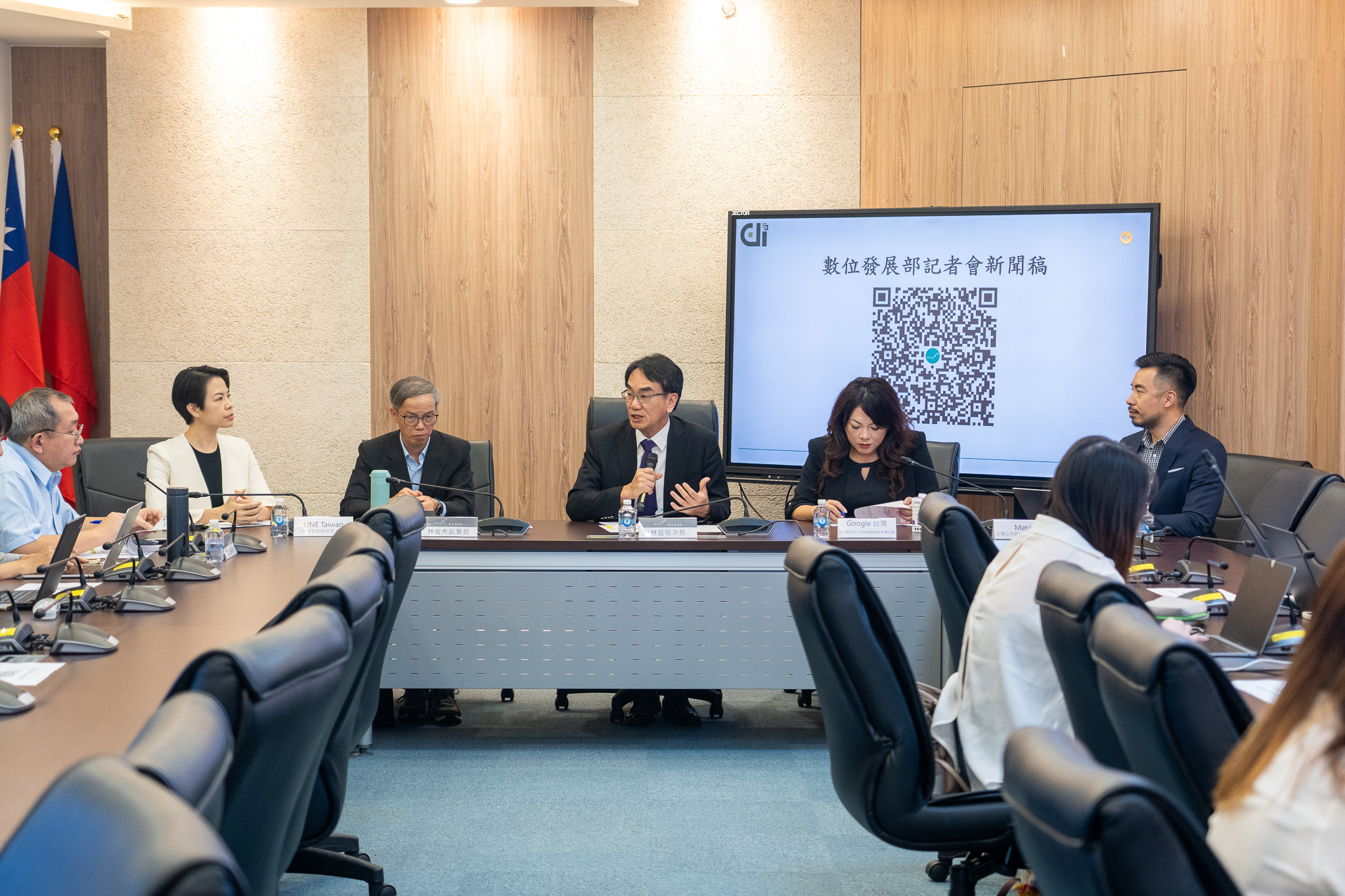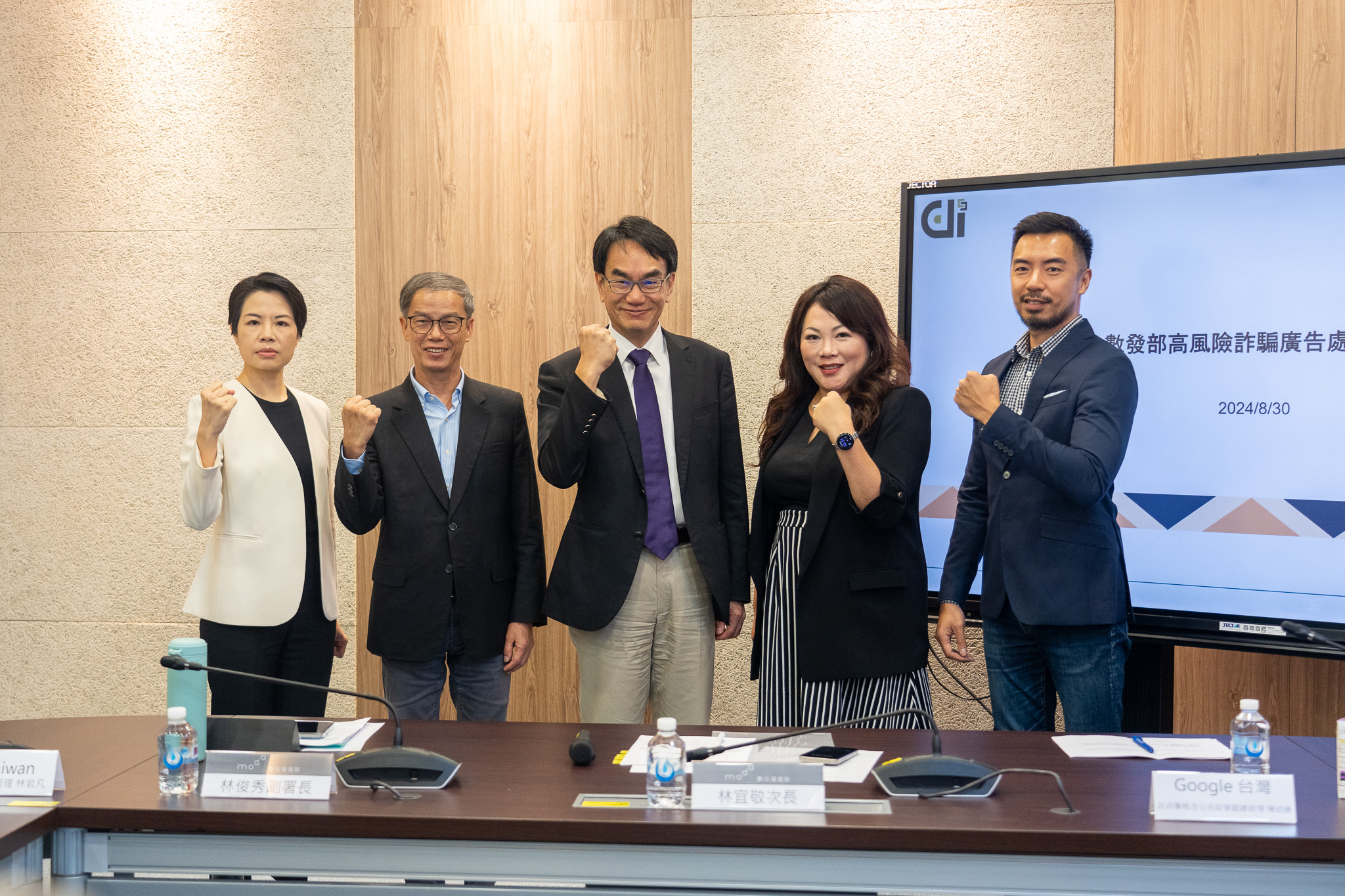Ministry of Digital Affairs Collaborates with Google, LINE, and Meta to Strengthen Online Anti-Fraud Measures
The Ministry of Digital Affairs (the MODA) joined forces with three major platforms - Google, LINE, and Meta - to hold a press conference on strengthening online anti-fraud measures. Deputy Minister Yi-Jing Lin stated that the joint efforts between the government and platform operators will significantly enhance anti-fraud measures. The MODA will continue to work with these platforms to combat online fraud and hopes that public-private cooperation will improve online safety and create a safer, more transparent digital environment for Taiwanese citizens.
Deputy Minister Lin highlighted the Three Arrows of Digital Development policy, with the first arrow focusing on anti-fraud efforts in the digital economy, which is crucial for building a digital trust system. The recently passed Fraud Prevention Act will impose anti-fraud obligations on online advertising platforms. The MODA plans to collaborate with these platforms to strengthen mechanisms for removing fraudulent ads, ensuring public safety, and creating a secure digital environment.
The MODA also announced the development of a new digital anti-fraud tool, the Fraud Buster System, which is being tested internally. This tool will allow the public to report fraudulent websites and reduce scam risks. In response to fraudulent content impersonating celebrities on platforms, the MODA launched a Public Figure Anti-Fraud Reporting Mailbox in late May. The MODA has established reporting channels with 44 celebrities, and some have noted that impersonation issues have been effectively controlled. In the future, the Fraud Buster System will integrate the Public Figure Anti-Fraud Reporting Mailbox and invite celebrities to participate in system testing. User feedback will be collected to enhance the system’s functionality continually.
Google, LINE, and Meta fully support the government’s efforts to combat fraud. They acknowledged that fraud is a significant challenge for Taiwan, and public-private collaboration is crucial for improving online safety. These platforms will work closely with the MODA, the Criminal Investigation Bureau, the Financial Supervisory Commission, and various government agencies to jointly address and prevent online fraud.
Google, LINE, and Meta announced strengthened online anti-fraud measures in collaboration with the MODA: Google stated that they have been implementing global advertising verification since 2020 and introduced financial advertisements verification in Taiwan in 2022, which permits only entities authorized by Taiwan’s regulatory agencies to advertise financial services. To further enhance transparency and reduce fraud risks, Google has updated various advertising policies and launched the Advertising Information Disclosure Center in 2023, allowing users to access advertiser information easily. Additionally, Google has enacted a restricted ad-serving policy to minimize the risk of fraudsters using new accounts to disseminate large volumes of ads.
With its 22 million monthly active users, LINE emphasized its stringent management of direct ad placements on its platform. They permit only Financial Supervisory Commission-approved financial institutions to run investment advertisements. Since 2023, LINE has proactively identified and addressed high-risk accounts involved in financial investment fraud. By the end of July 2024, they had suspended 10,419 accounts suspected of fraudulent activities. Additionally, LINE has implemented warning messages, such as” Please be aware of potential fraudulent behavior” across one-on-one and group chats, personal profiles, LINE communities, and LINE Official Accounts. LINE is also collaborating with the MODA to promote anti-fraud education through initiatives like live streaming at the LINE TODAY Taipei Film Festival to raise public awareness and enhance anti-fraud vigilance.
Meta stated that it collaborates with the MODA to implement comprehensive anti-fraud measures across five key aspects. First, they are utilizing AI technology to detect and remove fraudulent content. Second, they have been swiftly taking down fraudulent advertisements reported by government agencies. Third, they have been working with Taiwan’s law enforcement to address fraud crimes jointly. Fourth, they have been requiring financial service advertisers to complete identity verification, which enables the public to identify ad sponsors. Finally, Meta is partnering with government agencies and non-profit organizations to promote long-term public anti-fraud education and advocacy. Through these five strategies, Meta aims to effectively combat fraud and work collaboratively with the nation to prevent it.

